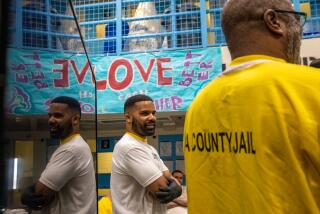‘If someone is 36 years old, it doesn’t mean they have been in trouble the last 20 years.’
- Share via
The prisoners who check into the halfway house downtown are shocked to meet the boss. Margery McGowan, an attractive 34-year-old, directs a community pre-release center that houses male felons easing their way from prison to parole. A San Diego transplant from upstate New York, McGowan studied nursery-school education before college pals suggested that she go into counseling. Equipped with a degree in social work, she resisted “doing welfare checks down in New York City” and became a “burned out” nursing home social worker instead. She headed West for adventure seven years ago, and found a career with Volunteers of America. She is pleased with the 60% employment rate among the residents of the unmarked, century-old clapboard house on 11th Avenue and plans to move into corporate administration for VOA. As for the counseling talent that led her to social work, she still uses it daily. Not only do the men she calls “my guys” need her help, but staff turnover is high and “they have a lot of problems.” McGowan was interviewed by Times staff writer Nancy Reed and photographed by Peter B. McCurdy.
When I was director of the Men’s Rehabilitation Center down on 4th and G, most of the men had drug and alcohol problems. We gave them meal tickets rather than money, and we helped them with personal problems--I was known to go into one of the local bars on 4th Avenue and pull somebody off a bar stool . . . or bang on somebody’s motel room door when he was up there with a bottle of gin and I thought he had a lot more potential than that. We showed them that we cared.
When this program opened, a lot of my guys from the men’s rehabilitation center helped paint this building and move furniture and all that kind of stuff.
Working with adults between 18 and 64 is not popular. But I enjoy it, it’s a challenge.
I have a 22-year-old college student from Iowa who says it is way different working here than she thought. Most college students will work with juvenile probation or adult female offenders, but very rarely with adult men. They figure by that time it’s hopeless. If you can’t reach them when they are juveniles, then forget it.
I don’t feel that way. Granted, some get into that revolving-door syndrome. A lot of the younger guys we have in here had parents left over from the ‘60s generation who didn’t know how to bring up children. And the kids turned to peer groups like gangs.
But, for some of the adults, this may be the only bad experience they have had, the only crime they have committed.
If someone is 36 years old, it doesn’t mean they have been in trouble the last 20 years. People don’t realize that.
The Department of Corrections used to give us the paper work on the guys before they came here. We felt if the person was going to be a problem, we could possibly keep him from coming into the program.
We made some bad mistakes on a couple. This one man--I guess it was a crime of passion--he shot his daughter’s boyfriend because he kept beating her. They put him in prison, he was retired Navy, he was like, 57, and diabetic. He had never worked a day in his life except in the Navy, and I thought, oh, great, what are you going to do with this person?
He came into the program, got a job as a janitor someplace, and by the time he got out, he was a supervisor for the company.
So after that, I just started throwing the paper work over my shoulder and said forget it. You never know what’s going to happen.
I just figure I will deal with the person as they come in the front door.
Guys do leave the program, and you find out through word of mouth that they are back in jail. But then a lot of them will come back six months, or a year later, and tell you how well they are doing and how happy they are, that they learned a lot, but they didn’t realize it when they were here. Some said they couldn’t have succeeded without it.
More to Read
Sign up for Essential California
The most important California stories and recommendations in your inbox every morning.
You may occasionally receive promotional content from the Los Angeles Times.













